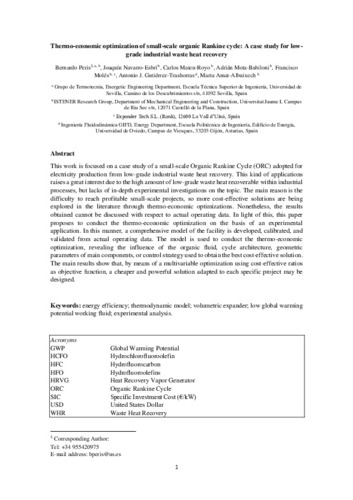Thermo-economic optimization of small-scale organic Rankine cycle: a case study for low-grade industrial waste heat recovery
Fecha de publicación:
Versión del editor:
Citación:
Resumen:
This work is focused on a case study of a small-scale Organic Rankine Cycle (ORC) adopted for electricityproduction from low-grade industrial waste heat recovery. This kind of applications raises a great in-terest due to the high amount of low-grade waste heat recoverable within industrial processes, but lacksof in-depth experimental investigations on the topic. The main reason is the difficulty to reach profitablesmall-scale projects, so more cost-effective solutions are being explored in the literature throughthermo-economic optimizations. Nonetheless, the results obtained cannot be discussed with respect toactual operating data. In light of this, this paper proposes to conduct the thermo-economic optimizationon the basis of an experimental application. In this manner, a comprehensive model of the facility isdeveloped, calibrated, and validated from actual operating data. The model is used to conduct thethermo-economic optimization, revealing the influence of the organicfluid, cycle architecture, geometricparameters of main components, or control strategy used to obtain the best cost-effective solution. Themain results show that, by means of a multivariable optimization using cost-effective ratios as objectivefunction, a cheaper and powerful solution adapted to each specific project may be designed.
This work is focused on a case study of a small-scale Organic Rankine Cycle (ORC) adopted for electricityproduction from low-grade industrial waste heat recovery. This kind of applications raises a great in-terest due to the high amount of low-grade waste heat recoverable within industrial processes, but lacksof in-depth experimental investigations on the topic. The main reason is the difficulty to reach profitablesmall-scale projects, so more cost-effective solutions are being explored in the literature throughthermo-economic optimizations. Nonetheless, the results obtained cannot be discussed with respect toactual operating data. In light of this, this paper proposes to conduct the thermo-economic optimizationon the basis of an experimental application. In this manner, a comprehensive model of the facility isdeveloped, calibrated, and validated from actual operating data. The model is used to conduct thethermo-economic optimization, revealing the influence of the organicfluid, cycle architecture, geometricparameters of main components, or control strategy used to obtain the best cost-effective solution. Themain results show that, by means of a multivariable optimization using cost-effective ratios as objectivefunction, a cheaper and powerful solution adapted to each specific project may be designed.
ISSN:
Patrocinado por:
The authors want to acknowledge the Jaume I University for itsfinancial support under the Ph.D grant PREDOC/2013/28 of Convocatoria d’ajudes predoctorals per a la formacio de personal investigador del Pla de promocio de la investigacio de la UniversitatJaume I de Castello (Spain)”. Adrian Mota-Babiloni acknowledges the financial support of the Valencian Government through the postdoctoral contract APOSTD/2020/032. Also to thank greatlyRank®, the ORC manufacturer, for its contribution in this project.
Colecciones
- Artículos [36472]
- Energía [252]
- Investigaciones y Documentos OpenAIRE [8111]
Ficheros en el ítem





